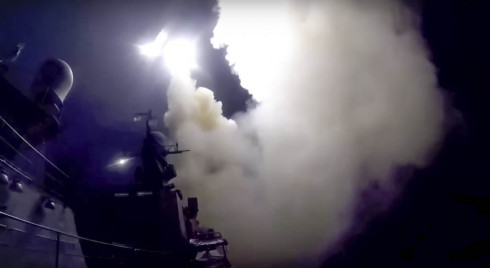
This article originally appeared at Politika translated by Stevo Marjanović exclusively for SouthFront
Russia’s president Vladimir Putin sent few clear messages to West, primarily to US, by launching cruise missiles from Caspian Sea.
First message is that Middle East is not an exclusive theater for western military interventions, subversion of existing regimes and installation of satellite governments and western-type democracy. Undoubtedly, that time has passed. Second message is that region of Caspian Sea, besides Iran, will remain post-Soviet area and US has to respect that. Third message is actually Putin’s gambit in this game of chess: his moves are conciliatory, but at the same he is setting a stage to confront US in case there is no conciliation. Because Vladimir Putin is making a series of political and military moves which are at the same time loud and effective, such is the launching of cruise missiles, but also subtle, such is his offer to Americans to work together against Islamic state, and even contradictory ones, such are contacts with Saudi Arabia. But, primarily, all these moves are centralized. So that Russia always have an answer to NATO’s future moves.
Namely, Great Britain has announced that it will send its permanent military contigent to bases in Poland and Baltic states, as an answer to Russian military intervention in Syria. Moscow immediately announced its countermeasure. What will it be? In April 2000 Alexander Lukashenko announced agreement with Moscow about formation of joint military forces of Russia and Belarus, whose number will be around 300000 soldiers. Recently Russia announced formation of its military base in Belarus, and month before, big military drills between Belarussian and Russian army in Russia were held. To be precise, Moscows answer to NATO forces in Baltic states and Poland will be at least 150000 soldiers right at the border with Poland. There they are, since you asked for it.
When Russia launched cruise missiles, it created dismay and consternation in Western capitols, while public is now aware that Russia has a powerful and modern fleet in Caspian Sea, which is capable to fire missiles to targets as far as few thousands kilometers. If Russia clearly announced that it will help its friends, legal and legitimate governments that are asking them for help, that means Moscow will send military aid to every government in post-Soviet that is threatened by yellow and orange revolutions. Primarily regions of Caspian Sea and Euroasia, and it is not a coincidence that Vladimir Putin expressed his concerns about situations in those region.
Ten years ago, the director of the Caspian Studies Program at Harvard University, Brenda Scheffer said that “the US wants to control Central Asia by setting up small and mobile military bases in the Caucasus instead of large bases in Europe.” Brenda Scheffer noted “how dominant power in the region would not only control energy sources in Caspian region, but at the same time Afghanistan and Middle East, and that US sees Caucasus and Central Asia as whole. Caucasus is a gate to Central Asia.” Miss Scheiffer says how “energy sources in that region are not only a goals, but also a means, because infrastructure such are the oil and gas pipelines are the means to to establish relations that suit us, and NATO membership of Caucasus countries are a part of American foreign policy.” To be honest, Russia does not accept this, so after that the war broke out in Georgia in August 2008.
Russian missiles are fired from war ships in Caspian Sea are evidence of new generation of precise conventional weapons. Yeas, those rockets can carry a nuclear warhead. Up until now Western public was talking about imprecise Russian missiles Iraqi army launched in 1991, but now world came to know Russian cruise missiles. We need to look at the war in Syria and Russian military intervention in this light, along with the new Russian military doctrine, under which Russia is ready to be the first to use nuclear weapon to defend fundamental national interests.
Putin understands that conciliation with America is impossible, because interests of these two countries are incompatible, to say the least. Not just in post-Soviet area, but also in the Middle East. Thereby Putin tries to reach three audiences. First, to bury the positions of liberal, pro-American elements in Russia. Secondly, to destroy illusion that Europe cannot exist without US, by showing that Washington is hurting EU with its interests. Because Putin wants neutral Europe, or at least neutral Germany, and Putin knows Germans better than anyone. And thirdly, Putin is reaching to the American audience (or at least to that part of the audience that can understand something regarding geopolitical scene) to tell them that he does not want a new Cold War.
Missiles fired from Caspian Sea demonstrated the future of the world in case there is no conciliation between US and Russia.
Miroslav Lazanski



